|
|
|
Sort Order |
|
|
|
Items / Page
|
|
|
|
|
|
|
| Srl | Item |
| 1 |
ID:
153402


|
|
|
|
|
| Summary/Abstract |
This article investigates US responses to President Xi Jinping’s new model of major power relations in the context of American reflections on the engagement policy toward China. It argues that while the Obama administration endorsed the goal of avoiding confrontation between the two countries, it disagreed about how to reach the goal. Facing pressure to stand up against China due to the perceived failure of engagement policy, the administration became increasingly frank on the competition with China. The Sino-US strategic mistrust intensified and the chances of mishaps triggering an escalation increased when President Obama turned the presidency to Donald Trump.
|
|
|
|
|
|
|
|
|
|
|
|
|
|
|
|
| 2 |
ID:
081003


|
|
|
|
|
| Publication |
London, Routledge, 2008.
|
| Description |
xvi, 234p.
|
| Series |
Routledge contemporary China series
|
| Standard Number |
9780415438674
|
|
|
|
|
|
|
|
|
|
|
|
Copies: C:1/I:0,R:0,Q:0
Circulation
| Accession# | Call# | Current Location | Status | Policy | Location |
| 053154 | 327.51073/ZHA 053154 | Main | On Shelf | General | |
|
|
|
|
| 3 |
ID:
169958


|
|
|
|
|
| Summary/Abstract |
This article analyzes China’s geopolitical maneuvers in the wake of the International Arbitral Court ruling over the South China Sea territorial disputes brought up by the Philippines. It finds that while the Philippines won the case in the sphere of international law, China won the geopolitical battle not only because the court does not have effective enforcement mechanisms but also because the international community lacked the will to induce significant compliance given China’s forceful rejection as a great power.
|
|
|
|
|
|
|
|
|
|
|
|
|
|
|
|
| 4 |
ID:
172064


|
|
|
|
|
| Summary/Abstract |
This article examines the design, objectives, and implementation of the Belt Road Initiative (BRI) six years after its inception. It argues that although the BRI as a top-level design on which President Xi has staked his personal legacy is to serve China’s ambitious geostrategic and geo-economic interests, many developing countries have welcomed the BRI because of their desperate need in infrastructure construction. But the BRI’s popularity has exceeded the substance as China has yet to bridge many fault lines on the ground.
|
|
|
|
|
|
|
|
|
|
|
|
|
|
|
|
| 5 |
ID:
102786


|
|
|
|
|
| Publication |
2011.
|
| Summary/Abstract |
This paper explores how China's strategic motivations and calculations have both motivated and constrained its participation in East Asian regional cooperation. It argues that China's participation in regional economic and security cooperation is motivated first of all by the calculation of China's domestic interests to create a peaceful peripheral environment for its economic growth and political stability, particularly its frontier security and prosperity. The realist interests to enhance China's position in power competition with other major players in the region, particularly Japan and US, also play an important part in China's strategic calculation. These interest calculations, however, also set limits on China's participation in regional cooperation. These interest calculations have also shaped China's preference for an informal approach, emphasizing voluntarism and consensus building rather than legally binding resolutions, toward regional cooperation. This soft approach is a major barrier for many regional institutions to move beyond the stage of talking shops to effectively resolve conflicts in the region.
|
|
|
|
|
|
|
|
|
|
|
|
|
|
|
|
| 6 |
ID:
081277


|
|
|
|
|
| Publication |
2008.
|
| Summary/Abstract |
China has adopted a state-centered approach towards energy security to deepen political and commercial relationships with all energy producing nations and to aggressively invest in oil fields and pipelines around the world. Applying this approach to its relations with its Asia-Pacific neighbors has produced mixed results. While China's energy diplomacy has brought about opportunities for cooperation with some of its neighbors, notably some countries in Central Asia and continental Southeast Asia, it has become a source of conflict with some other neighbors, especially those with border disputes over maritime territories which may have rich natural resources. This paper examines China's state-led search for energy security and its implications for China's relations with Asia-Pacific countries
|
|
|
|
|
|
|
|
|
|
|
|
|
|
|
|
| 7 |
ID:
067786


|
|
|
| 8 |
ID:
050043
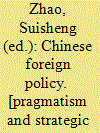

|
|
|
|
|
| Publication |
Armonk, M.E. Sharpe, 2003.
|
| Description |
xiv, 319p.
|
| Standard Number |
0765612844
|
|
|
|
|
|
|
|
|
|
|
|
Copies: C:1/I:0,R:0,Q:0
Circulation
| Accession# | Call# | Current Location | Status | Policy | Location |
| 047452 | 327.51/ZHA 047452 | Main | On Shelf | General | |
|
|
|
|
| 9 |
ID:
070705
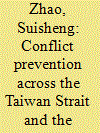

|
|
|
|
|
| Publication |
2006.
|
| Summary/Abstract |
China has developed a unique approach of conflict prevention characterized by liangshou celue -- literally, a "two hands" or a two-pronged strategy. It is a stick-and-carrot approach, involving an oscillating pattern of military coercion and peaceful offensive. After the fourth generation of Chinese leadership under Hu Jintao came to office, an Anti-Secession Law was passed by China's National People's Congress on March 14, 2005. Prescribing the conditions for military action against Taiwan, this law was described by some people in the West and Taiwan as a war authorization law, mainly driven by Chinese nationalism, to set a benchmark against nationalist pressure and show Chinese leaders' willingness to risk war across the Taiwan Strait at all cost. It thus is said to signify not only greater irrationality in China's policy toward Taiwan but also a change in the two-pronged conflict-prevention approach. Is Chinese nationalism in fact a cause of international aggression, making China's policy toward Taiwan irrational and inflexible? Does the Anti-Secession Law signal that Beijing is on a path that reduces its scope for rational choices? This article will explore the making of the Anti-Secession Law to find answers to these questions.
|
|
|
|
|
|
|
|
|
|
|
|
|
|
|
|
| 10 |
ID:
073149
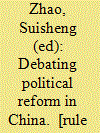

|
|
|
|
|
| Publication |
Armonk, M E Sharpe, 2006.
|
| Description |
xv, 295p.
|
| Standard Number |
0765617315
|
|
|
|
|
|
|
|
|
|
|
|
Copies: C:1/I:0,R:0,Q:0
Circulation
| Accession# | Call# | Current Location | Status | Policy | Location |
| 051504 | 320.951/ZHA 051504 | Main | On Shelf | General | |
|
|
|
|
| 11 |
ID:
005515
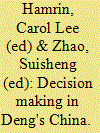

|
|
|
|
|
| Publication |
New York, M E Sharpe, 1995.
|
| Description |
xlvii, 255p.
|
| Standard Number |
1563245027
|
|
|
|
|
|
|
|
|
|
|
|
Copies: C:1/I:0,R:0,Q:0
Circulation
| Accession# | Call# | Current Location | Status | Policy | Location |
| 036808 | 320.951/HAM 036808 | Main | Withdrawn | General | |
|
|
|
|
| 12 |
ID:
172698
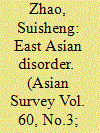

|
|
|
|
|
| Summary/Abstract |
In the South China Sea territorial disputes, China has shifted from a delaying strategy characterized by strategic ambiguity to strategic clarity and an increasingly assertive stance. Yet, this power play, asserting sovereignty over a large portion of the South China Sea, has not prompted a decisive push-back from regional states or major powers, raising the question of what kind of norms China will bring to the regional order and indicating the difficulty of building rules-based order in a region characterized by unbounded power politics in a twenty-first-century Hobbesian struggle.
|
|
|
|
|
|
|
|
|
|
|
|
|
|
|
|
| 13 |
ID:
167324
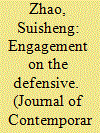

|
|
|
|
|
| Summary/Abstract |
Facing powerful challenges from both China and the US, the long-standing engagement policy is on the defensive. Focusing on advancing American economic and security interests rather than its ideals and prioritizing reciprocity above economic cooperation, the Trump administration has declared China a strategic competitor and escalated a trade war into a multi-front conflict. However, profound interdependence continues underpinning the bilateral relationship. Neither the US nor China can afford to disengage from the other. The two countries are not natural partners but not inevitable enemies either. Competition does not mean confrontation, much less war. Engagement remains the foundation for healthy competition.
|
|
|
|
|
|
|
|
|
|
|
|
|
|
|
|
| 14 |
ID:
123709
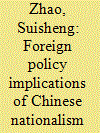

|
|
|
|
|
| Publication |
2013.
|
| Summary/Abstract |
This paper revisits the debate about foreign policy implications of Chinese nationalism in the context of China's increasingly confrontational and assertive behavior in recent years. It argues that while the Chinese government made effective efforts to control popular nationalism and Chinese foreign policy was therefore not dictated by emotional nationalistic rhetoric before 2008, it has become more willing to follow the popular nationalist calls to take a confrontational position against the Western powers and to adopt tougher measures in maritime territorial disputes with its neighbors. This strident turn is partially because the government is increasingly responsive to public opinion, but more importantly because of the convergence of Chinese state nationalism and popular nationalism calling for a more muscular Chinese foreign policy. Enjoying an inflated sense of empowerment supported by its new quotient of wealth and military capacities, and terrified of an uncertain future due to increasing social, economic and political tensions at home, the communist state has become more willing to play to the popular nationalist gallery in pursuing the so-called core national interests. These developments have complicated China's diplomacy, creating a heated political environment to harden China's foreign policy.
|
|
|
|
|
|
|
|
|
|
|
|
|
|
|
|
| 15 |
ID:
190289


|
|
|
|
|
| Summary/Abstract |
Chinese nationalism has been driven from two directions: by the state from top-down and by populist forces from the bottom-up. For many years, Chinese nationalism was driven more by the need to survive as a country (affirmative) than driven by big power ambition (assertive), because the communist state made effective efforts to control the expression of popular nationalism that was more emotional and hostile to Western powers. Making use of nationalism for regime legitimacy, the communist state took a pragmatic attitude to make sure that Chinese foreign policy was not dictated by the emotional rhetoric of popular nationalism, which would have damaged cooperative relations with Western powers and Asian neighbors that China’s economic success depended heavily upon after the Cold War.Footnote
|
|
|
|
|
|
|
|
|
|
|
|
|
|
|
|
| 16 |
ID:
145880
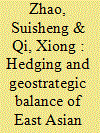

|
|
|
|
|
| Summary/Abstract |
While most East Asian countries have opted for a hedge strategy to preserve a maximum range of strategic options in response to the rise of China, some countries have engaged in geostrategic balance through collective bargaining and strategic alignments with the US and with each other. The divergent threat perceptions and complicated historical animosities among East Asian countries, however, have set a limitation on the geostrategic balance. Therefore, to bandwagon with China could be a realistic choice for many countries. Historically, the most successful rising powers have been those which attracted the greatest number of bandwagoners. China cannot rise successfully without winning the support of its Asian neighbors. The long term peace and stability in the region, therefore, depends not only on whether China’s neighbors can work together to balance China but also whether China can balance its relationships in its own backyard so that its neighbors find bandwagoning a positive choice.
|
|
|
|
|
|
|
|
|
|
|
|
|
|
|
|
| 17 |
ID:
149061
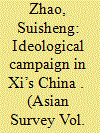

|
|
|
|
|
| Summary/Abstract |
President Xi Jinping has launched the largest ideological campaign in post-Mao China, which has brought a Maoist revival. But Xi is not in a position to make a full return to the Mao era because ideologically driven repression offers no long-run solution to China’s problems. Drawing on elements of Mao’s legacy, Xi aims to rebuild the regime’s legitimacy when it is increasingly vulnerable to economic slowdown and public anger about corruption, income disparity, and pollution, an embarrassing confession of regime fragility.
|
|
|
|
|
|
|
|
|
|
|
|
|
|
|
|
| 18 |
ID:
107030
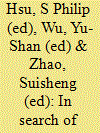

|
|
|
|
|
| Publication |
London, Routledge, 2011.
|
| Description |
xvi, 252p.
|
| Series |
Routledge contemporary China series
|
| Standard Number |
9780415587488, hbk
|
|
|
|
|
|
|
|
|
|
|
|
Copies: C:1/I:0,R:0,Q:0
Circulation
| Accession# | Call# | Current Location | Status | Policy | Location |
| 056186 | 338.951/HSU 056186 | Main | On Shelf | General | |
|
|
|
|
| 19 |
ID:
192116


|
|
|
|
|
| Summary/Abstract |
Beijing has played a long game on Taiwan for more than seventy years. Starting with Mao Zedong’s aborted aspiration of military liberation in 1949, Deng Xiaoping, Jiang Zemin, and Hu Jintao focused on peaceful unification although they never renounced the use of force. With the rhetoric of striving for peaceful unification, Xi Jinping has relied more on brinkmanship to press Taiwan to accept his hardened terms of unification. Xi has made clear that the Taiwan question is China’s core national interest and essentially non-negotiable, important enough to go to war if pushed. China as a ‘divided nation’ cannot sit well with Xi’s China Dream, the catch-all term for Xi’s ambition for great-power status. Riding on the nationalist currents he whipped up, Xi will end the long game according to his timetable, or sooner if the brinkmanship fails and the red lines crossed, whether China is ready or not.
|
|
|
|
|
|
|
|
|
|
|
|
|
|
|
|
| 20 |
ID:
058629


|
|
|
|
|
| Publication |
Stanford, Stanford University Press, 2004.
|
| Description |
xii, 355p.
|
| Standard Number |
0804750017
|
|
|
|
|
|
|
|
|
|
|
|
Copies: C:1/I:0,R:0,Q:0
Circulation
| Accession# | Call# | Current Location | Status | Policy | Location |
| 049065 | 320.540951/ZHA 049065 | Main | On Shelf | General | |
|
|
|
|
|
|
|
|
|